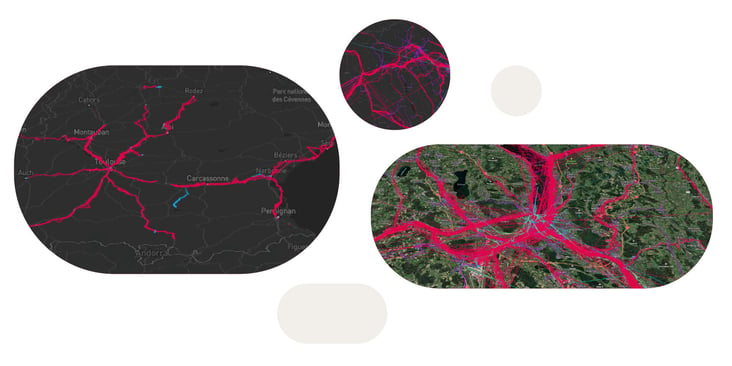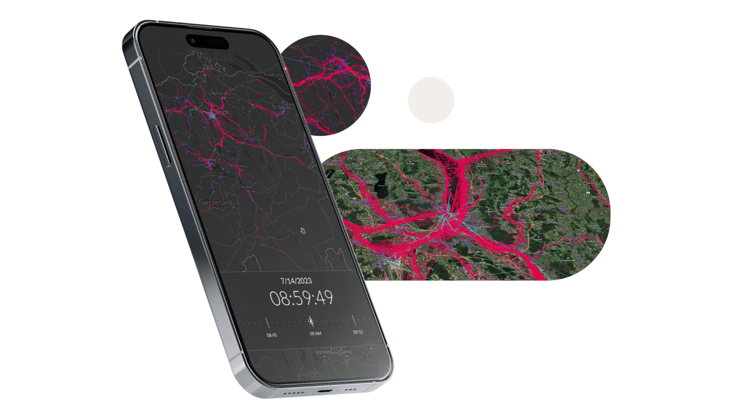
“Back to school!” was the motto for FAIRTIQ in December 2022. Paula Ruoff, Sales & Business Development Lead Germany, and Elias Blum, Product Owner, were virtual guests at the Lucerne University of Applied Sciences and Arts (HSLU) on 3 December 2022. As part of the further education programme, “Transformation of Public Transport”, designed and led by Prof. Widar von Arx, they contributed to the three-day module, “Pricing, Sales and Revenue Protection in Public Transport”, along with Stefan Germann, Head of Analysis and Revenue Protection at Swiss Federal Railways (SBB), and Bruno Lehmann, Head of Industry Services and Deputy Managing Director at Alliance SwissPass.
FAIRTIQ’s contribution focused on innovation potential – a topic that is the driving force behind numerous activities at FAIRTIQ, and on which we are always happy to share our experiences and develop new ideas together. FAIRTIQ also saw taking part in the further education programme as an opportunity for exchange. Instead of opting for a traditional “chalk and talk” approach, the session combined a presentation with discussion topics to encourage participants to ask questions and formulate their own ideas.
Changing customer needs
A brief presentation of FAIRTIQ, including our philosophy, network, approach, products and their possible uses was followed by a deep dive into the changing requirements of passengers under the heading, “Changing customer needs” – and how FAIRTIQ and its partners respond to them with new solutions. The participants found thinking about the bigger picture particularly fascinating. Concrete areas of application from Germany, Austria, France and Switzerland illustrated the range of changes as well as the innovative approaches that are being pursued in the different regions in which FAIRTIQ technology is used. The approaches presented and discussed included various capping models, discount systems and the increasing use of airline tariffs for calculating fares in public transport.
-1676306685.jpg)
Simplicity vs. individualisation
The second part of the session then turned to “Trade-off: simplicity vs. individualisation". In other words: what should the pricing of public transport include? Should there be one-size-fits-all, off-the-shelf approaches or tailor-made offers? Or, perhaps, both? Other issues discussed in this context included, what does fairness mean when it comes to pricing? Should there be a simplified price range? Do personalised prices have a place in public transport? The focus was on existing and possible future forms of price differentiation and new tariff models such as capping and bonus models.
Marketing and pricing
The third and last part was all about the “Possibility and limits of marketing and pricing”. Here, too, the two FAIRTIQ lecturers provided deep insights into practical applications. They presented ongoing marketing experiments and campaigns from Liechtenstein, Switzerland and Austria. This included approaches for sustainable employee mobility, such as the digital public transport budget, as well as the cooperation between FAIRTIQ and the University of Natural Resources and Life Sciences (BOKU) in Vienna, which allows students to commute between the various university locations at greatly reduced prices.
In terms of marketing, our basic approach (experimental, data-driven, incremental) was presented, as was the specific approach to target group-specific marketing. It became clear that our focus is always on the customer and their needs. FAIRTIQ supports transport companies in strengthening passenger loyalty to public transport and in attracting new passengers to buses and trains. This was illustrated using the example of the different marketing strategies for activating new users, reactivating those who have not travelled for more than a month and regaining users who have stopped using public transport. The presentation provided lots of material for the subsequent group discussion with the students, which included considering the role of price incentives and also socio-political and modal shift approaches to price-setting.
Commitment to education benefits the entire industry
“The discussion was fascinating,” says Paula Ruoff, who added, “the exchange made it possible to show the various approaches and also to highlight where there are conflicting goals. It wasn’t just the participants in the course who benefited from the learning experience, but us too at FAIRTIQ and the entire public transport sector. Because to be able to shape the public transport of the future, we need openness and exchange between service providers, practitioners and science in order to advance new ideas and innovative solutions. This is also why FAIRTIQ is involved in education – to show how exciting, how diverse and how attractive the professional field of public transport is.”
The module-based further education programme, “Transformation of Public Transport” (CAS TPT), was offered for the first time at the HSLU in 2022. Over seven months, relevant knowledge and current know-how in relation to managing and further developing the public transport system are taught in a total of seven modules, which can also be attended individually. The course will be held for a second time, starting from August 2023. Interested parties can find the syllabus and all other information on the HSLU website. FAIRTIQ will also get involved again to present current developments and contribute practical case studies to the class.







Share